 W
WThe Book of Samuel forms part of the narrative history of Israel in the Nevi'im or "prophets" section of the Hebrew Bible/Old Testament called the Deuteronomistic history, a series of books that constitute a theological history of the Israelites and aim to explain God's law for Israel under the guidance of the prophets. According to Jewish tradition, the book was written by Samuel, with additions by the prophets Gad and Nathan. Modern scholarly thinking is that the entire Deuteronomistic history was composed in the period c. 630–540 BC by combining a number of independent texts of various ages.
 W
WAbigail was the wife of Nabal; she became a wife of the future King David after Nabal's death. Abigail was David's second wife, after Saul's daughter, Michal, whom Saul later married to Palti, son of Laish when David went into hiding, and Ahinoam.
 W
WAbsalom, according to the Hebrew Bible, was the third son of David, King of Israel with Maacah, daughter of Talmai, King of Geshur.
 W
WAhimaaz was son of the high priest Zadok.
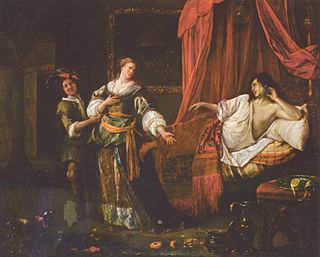 W
WAmnon was the oldest son of King David and his second wife, Ahinoam of Jezreel. He was born in Hebron during his father's reign in Judah. He was the heir apparent to the throne of Israel until he was assassinated by his half-brother Absalom to avenge the rape of their sister Tamar.
 W
WArmoni and Mephibosheth are named in the Hebrew Bible as the two sons of Saul by his concubine Rizpah, daughter of Aiah. After Saul's death, they were killed in revenge for his violence against the Gibeonites.
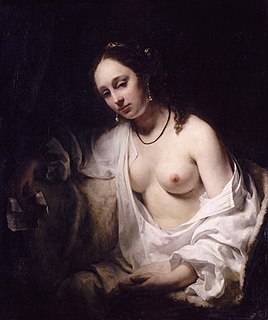 W
WBathsheba was the wife of Uriah the Hittite and later of David, according to the Hebrew Bible. She is most known for the biblical narrative in which she was summoned by King David, who had seen her bathing and lusted after her. She was the mother of Solomon, who succeeded David as king, making her the Queen mother.
 W
WThe Battle of Aphek is a biblical episode described in 1 Samuel 4:1–10 of the Hebrew Bible. During this battle the Philistines defeated the Israelite army and captured the Ark of the Covenant. Among biblical scholars, the historicity of the early events in the Book of Samuel is debated, with some scholars leaning toward many events in Samuel being historical, and some scholars leaning towards less.
 W
WAccording to 2 Samuel, the Battle of the Wood of Ephraim was a military conflict between the rebel forces of the formerly exiled Israelite prince Absalom against the royal forces of his father King David during a short-lived revolt.
 W
WBethlehem is a city located in the central West Bank, Palestine, about 10 km south of Jerusalem. Its population is approximately 25,000, and it is the capital of the Bethlehem Governorate. The economy is primarily tourist-driven, peaking during the Christmas season, when Christians make pilgrimage to the Church of the Nativity. The important holy site of Rachel's Tomb is located at the northern entrance of Bethlehem, though not freely accessible to the city's inhabitants due to the Israeli West Bank barrier.
 W
WDavid is described in the Hebrew Bible as the third king of the United Monarchy of Israel and Judah, becoming king after Ish-bosheth. In the Books of Samuel, David is a young shepherd who gains fame first as a musician and later by killing the enemy champion Goliath. He becomes a favorite of King Saul and a close friend of Saul's son Jonathan. Worried that David is trying to take his throne, Saul turns on David. After Saul and Jonathan are killed in battle, David is anointed as King. David conquers Jerusalem, taking the Ark of the Covenant into the city, and establishing the kingdom founded by Saul. As king, David commits adultery with Bathsheba, leading him to arrange the death of her husband Uriah the Hittite. David's son Absalom schemes to overthrow David. David flees Jerusalem during Absalom's rebellion, but after Absalom's death he returns to the city to rule Israel. Because David shed much blood, God denies David the opportunity to build the temple. Before his peaceful death, he chooses his son Solomon as successor. He is honored in the prophetic literature as an ideal king and the forefather of a future Messiah, and many psalms are ascribed to him.
 W
WDavid and Jonathan were heroic figures of the Kingdom of Israel, who formed a covenant recorded in the books of Samuel.
 W
WDavid's Mighty Warriors are a group of 37 men in the Hebrew Bible who fought with King David and are identified in 2 Samuel 23:8–38, part of the "supplementary information" added to the Second Book of Samuel in its final four chapters. The International Standard Version calls them "David's special forces".
 W
WEben-Ezer is a location that is mentioned by the Books of Samuel as the scene of battles between the Israelites and Philistines. It is specified as having been less than a day's journey by foot from Shiloh, near Aphek, in the neighbourhood of Mizpah, near the western entrance of the pass of Bethoron. However, its location has not been identified in modern times with much certainty, with some identifying it with Beit Iksa, and others with Dayr Aban.
 W
WEli was, according to the Books of Samuel, a High Priest of Shiloh. When Hannah came to Shiloh to pray for a son, Eli initially accused her of drunkenness, but when she protested her innocence, Eli wished her well. Hannah's eventual child, Samuel, was raised by Eli in the tabernacle. When Eli failed to rein in the abusive behavior of his sons, Yahweh promised to punish his family, resulting eventually in the death of Eli and his sons. Later biblical passages mention the fortunes of several of his descendants, and he figures prominently in Samaritan tradition.
 W
WGoliath is described in the biblical Book of Samuel as a Philistine giant defeated by the young David in single combat. The story signified Saul's unfitness to rule, as Saul himself should have fought for Israel. Scholars today believe that the original listed killer of Goliath was Elhanan, son of Jair, and that the authors of the Deuteronomic history changed the original text to credit the victory to the more famous character, David.
 W
WHannah is one of the wives of Elkanah mentioned in the First Book of Samuel. According to the Hebrew Bible she was the mother of Samuel.
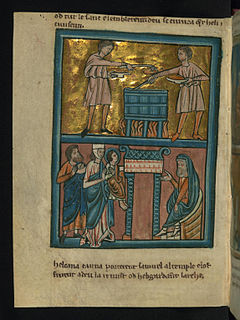 W
WHophni and Phinehas or Phineas were the two sons of Eli. The first book of Samuel describes them as the officiating priests at the sanctuary of Shiloh at the time of Hannah. According to Josephus, Phinehas officiated as high priest because Eli had resigned as high priest at Shiloh because of his advanced age.
 W
WIsh-bosheth, also called Eshbaal was the son of King Saul and the second king over the Kingdom of Israel.
 W
WJoab the son of Zeruiah, was the nephew of King David and the commander of his army, according to the Hebrew Bible.
 W
WJonadab is a figure in the Hebrew Bible, appearing in 2 Samuel 13. He is described in verse 3 as the son of Shimeah, who was the brother of David, making Jonadab a cousin to Amnon as well as his friend. He is called "very wise", usually translated as "very shrewd" (NIV) or "very crafty" (ESV).
 W
WJonathan is a heroic figure in 1 Samuel in the Hebrew Bible. A prince of the United Kingdom of Israel, he was the eldest son of King Saul as well as a close friend of David, who eventually succeeded Saul as king.
 W
WAccording to the Books of Samuel of the Tanakh, Mephibosheth was the son of Jonathan, grandson of King Saul and father of Mica or Micha.
 W
WMichal was, according to the first Book of Samuel, a princess of the United Kingdom of Israel; the younger daughter of King Saul, she was the first wife of David, who later became king, first of Judah, then of Israel.
 W
WMidrash Samuel is an aggadic midrash on the books of Samuel.
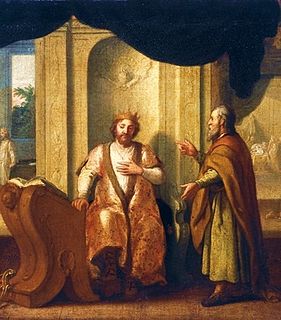 W
WNathan is a prophet in the Hebrew Bible. His actions are described in the Books of Samuel, Kings, and Chronicles.
 W
WOf Kings and Prophets is an American television drama based on the Biblical Books of Samuel that premiered on ABC. The series follows an ensemble of characters including Saul and David, the successive Kings of Israel, their families, and their political rivals. Of Kings and Prophets is set in the Kingdom of Israel, but filmed in Cape Town, South Africa.
 W
WPeninnah was one of Elkanah's two wives, briefly mentioned in the first Book of Samuel. Her name may derive from פְּנִנָּה (pəninnāh), meaning "coral".
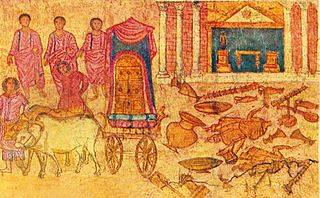 W
WThe Philistine captivity of the Ark was an episode described in the biblical history of the Israelites, in which the Ark of the covenant was in the possession of the Philistines, who had captured it after defeating the Israelites in a battle at a location between Eben-ezer, where the Israelites encamped, and Aphek, where the Philistines encamped.
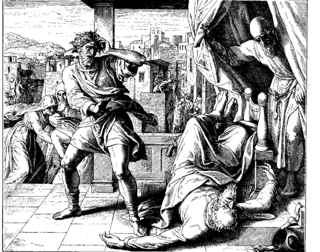 W
WThe wife of Phinehas is an unnamed character in the Hebrew Bible. Her story covers just a few verses at the end of 1 Samuel 4, where she is introduced as the daughter-in-law of Eli and the wife of Phinehas. She is about to give birth when she hears that the Ark of God had been captured by the Philistines. She dies in childbirth, and calls her son "Ichabod", saying, "The glory has departed from Israel."
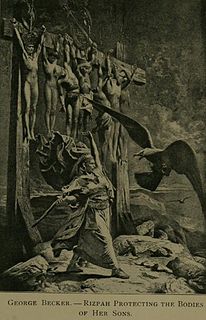 W
WRizpah was the daughter of Aiah, and one of Saul's concubines. She was the mother of Armoni and Mephibosheth.
 W
WSamuel is a figure who, in the narratives of the Hebrew Bible, plays a key role in the transition from the period of the biblical judges to the institution of a kingdom under Saul, and again in the transition from Saul to David. He is venerated as a prophet by Jews, Christians, and Muslims. In addition to his role in the Hebrew Scriptures, Samuel is mentioned in the New Testament, in rabbinical literature, and in the second chapter of the Qur'an. He is also treated in the fifth through seventh books of Josephus's Antiquities of the Jews, written in the first century CE (AD). He is first called the Seer in 1 Samuel 9:9.
 W
WSaul, according to the Hebrew Bible, was the first king of the United Kingdom of Israel. His reign, traditionally placed in the late 11th century BCE, supposedly marked a transition from a tribal society to statehood.
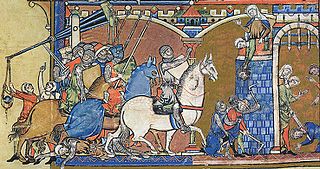 W
WIn the Old Testament, Sheba was a Benjaminite leader who revolted against King David, recounted in 2 Samuel.
 W
WThe Song of Hannah is a poem interpreting the prose text of the Books of Samuel. According to the surrounding narrative, the poem was a prayer delivered by Hannah, to give thanks to God for the birth of her son, Samuel. It is very similar to Psalm 113 and the Magnificat.
 W
WThe Suicide of Saul is an oil-on-panel by the Netherlandish Renaissance artist Pieter Bruegel the Elder, painted in 1562. It is in the collection of the Kunsthistorisches Museum in Vienna.
 W
WTamar is a figure described in 2 Samuel in the Hebrew Bible. In the biblical narrative, she is the daughter of King David, and sister of Absalom. In 2 Samuel 13, she is raped by her half-brother Amnon.
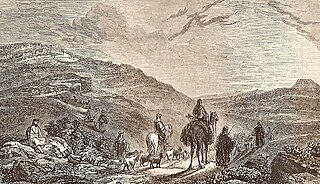 W
WTeqoa is a Palestinian town in the Bethlehem Governorate, located 12 km southeast of Bethlehem in the West Bank. The town is built adjacent to the biblical site of Tekoa (Thecoe), now Khirbet Tuqu’, from which it takes its name. Today's town includes three other localities: Khirbet Ad Deir, Al Halkoom, and Khirbet Teqoa. According to the Palestinian Central Bureau of Statistics (PCBS), Teqoa had a population of 8,881 in 2007.
 W
WUriah the Hittite is a minor character in the Hebrew Bible, mentioned in the Books of Samuel, an elite soldier in the army of David, king of Israel and Judah, and the husband of Bathsheba, the daughter of Eliam. While Uriah is serving in David's army abroad, David himself, from the roof of his palace, looks down on his city and spies Bathsheba bathing in the privacy of her courtyard. Moved by lust at the sight of her, David calls for her to be brought to him and sleeps with her, impregnating her. In an effort to hide his misdeeds, David tries to call on Uriah to return home from war, hoping that the two will have relations and that he will be able to pass the child off as belonging to Uriah. But Uriah, being a disciplined soldier, refuses to leave his post. So, David murders him by proxy, ordering all of Uriah's comrades to abandon him in the midst of battle, so that he is killed by an opposing army. Following Uriah's death, David takes Bathsheba as his eighth wife.
 W
WAccording to the Tanakh, עזה, Uzzah or Uzza, meaning "Her Strength", was an Israelite whose death is associated with touching the Ark of the Covenant. The account of Uzzah appears in two places in scripture: 2 Samuel 6:3–8 and 1 Chronicles 13:7–11
 W
WThe wise woman of Abel is an unnamed figure in the Hebrew Bible. She appears in 2 Samuel 20, when Joab pursues the rebel Sheba to the city of Abel-beth-maachah. The woman, who lives in Abel, institutes a parley with Joab, who promises to leave the city if Sheba is handed over to him. The woman speaks to the people of the city, and they behead Sheba, throwing his head over the wall, at which Joab departs.
 W
WIn the Hebrew Bible, the witch of Endor is a woman Saul consulted to summon the spirit of prophet Samuel in the 28th chapter of the First Book of Samuel in order to receive advice against the Philistines in battle after his prior attempts to consult God through sacred lots and prophets had failed. The witch is absent from the version of that event recounted in the deuterocanonical Book of Sirach (46:19–20).
 W
WThe woman of Tekoa is an unnamed figure in the Hebrew Bible. She appears in 2 Samuel 14, after Absalom has been banished following his murder of Amnon. Joab wants David to be reconciled to Absalom, and he sends to Tekoa to find a "wise woman". Joab tells the woman to pretend to be mourning, and she tells a story to David to elicit his sympathy and obtain his favourable judgement. The woman says that her son killed his brother, and now the rest of the family wants to kill him. When David decides that her son should be spared, the Tekoite woman tells him that he should do the same for Absalom.
 W
WZiba (ציבא) is a man in 2 Samuel in the Hebrew Bible. He was a servant of Saul, and then later of Saul's grandson, Mephibosheth.
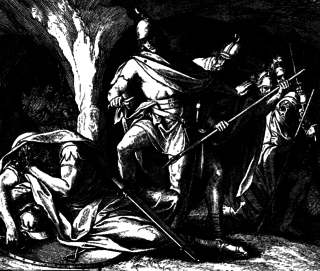 W
WZiph was a town in the Judean Mountains south-east of Hebron. Here David hid himself from Saul. The name of Zif is found about four miles south of Hebron, attached to a rounded hill of some 100 feet in height, which is called Tell Zif. Its name appears on a number of LMLK seals along with those of Hebron, Socoh and MMST. It has been identified as the Palestinian village of Zif, Hebron.